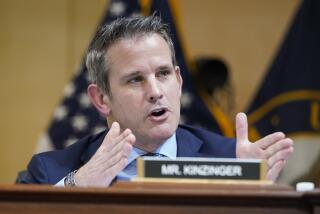Duke Will Run Against Bush in Primaries
- Share via
WASHINGTON — Proclaiming himself the champion of middle-class America, David Duke on Wednesday unveiled plans to challenge President Bush in the 1992 Republican primary campaign, and raised the prospect of running for the White House as a third-party candidate.
“I believe that the country under the Bush Administration is heading in the wrong direction,” declared the 41-year-old former Ku Klux Klan leader and Nazi sympathizer. “And I think the great mass of middle-class America agrees with me.”
At a news conference interrupted several times by hecklers, Duke focused on the type of emotion-laden issues that have made him a formidable political presence despite his notorious past.
For instance, he blamed crime, drug use and poverty in America’s “wasteland” cities on the welfare system. He said: “We’ve got to be concerned more about stopping the criminal on our streets than stopping political dictators around the world.”
The White House, as it has in the past, strongly denounced Duke. Marlin Fitzwater, Bush’s press secretary, said: “We believe David Duke represents the worst in American politics. He stands for bigotry, racism and other qualities that have no place in American life.”
Duke, wearing a chalk-striped gray suit and flashing a ready smile, launched his presidential campaign a little more than two weeks after he lost a runoff election for the Louisiana governorship to Democrat Edwin W. Edwards.
In his 15-minute announcement speech, he ticked off a litany of Bush policies that he said “have been negative for the middle class of America.” His list was topped by the President’s support of a tax increase last year despite his oft-repeated campaign promise to the contrary.
“(Bush) said, ‘Read my lips,’ ” Duke recalled. “But what he meant, apparently, was ‘Kiss my hips.’ ”
Denouncing Bush’s advocacy of free trade with Mexico, he said: “We must not have free trade, we must have fair trade.”
And in that vein, he called for a firmer hand in dealing with U.S. trading partners, notably Japan.
“I come from Louisiana,” he said. “We produce rice. We must go to the Japanese and say, ‘You no buy our rice, we no buy your cars.’ ”
When a questioner accused him of using language that disparaged Japanese-Americans, Duke stood his ground. Professing his admiration and respect for the Japanese people, he countered that he used the phrase “because that’s how some people would say it, and that just brought the issue and point home.”
While dismissing accusations of racism made against him by saying he has outgrown his past, he addressed the issue of race in the 1992 campaign in no uncertain terms.
“It’s time in this country to recognize and confront the basic social issues that we now face,” Duke said. “I believe very strongly that President Bush has sold out the Republican Party when he signed the most recent so-called civil rights bill.”
Recalling that the President had vetoed similar legislation last year, Duke said: “If the bill of a year ago was a quota bill, then certainly the bill that he recently signed was also a quota bill.”
Duke also complained that, while Bush has criticized the welfare system, he had failed to move to correct its faults. His own proposals include “policies to encourage welfare recipients to practice birth control and to be responsible in terms of their birthing patterns.”
In answer to a question, Duke said he was not advocating mandatory sterilization or birth control. Rather, he said he meant that birth control instruction should be made a pre-condition for welfare so that aid recipients “know the ways that you can prevent unwanted births for the benefit of the mother and the benefit of society.”
Duke singled out immigration as “the big issue” the nation faced in 1992. “I think the time has come . . . to begin to limit and stop the illegal immigration,” he said. “Our traditions are being torn away. Our values are being torn away. Our environment is being threatened by massive immigration and a massive increase in demographic problems in America.”
In pursuing his challenge of Bush, Duke said he expected to raise as much as $8 million and to take his campaign into “every nook and corner of the country.” He specifically cited 15 states, including California, New York and Texas.
He made an exception of New Hampshire, which holds the nation’s first presidential primary Feb. 18. He said the primary “is coming up too quickly for us to mobilize effectively.”
He also likely would have to contest not only Bush but conservative columnist Patrick J. Buchanan in New Hampshire. Buchanan is expected to announce his candidacy for the Republican nomination next week.
Despite his ambitious plans, Duke appeared to have limited expectations about his presidential prospects within the GOP. Instead, he talked about assuming a broker’s role at the party’s convention. “I know the American people are looking for alternatives,” he said. “I will be in a position (at the convention) with delegates to support alternative candidates to George Bush.”
He added that he was “not ruling out the possibility in the convention to throw support toward a stronger candidate if Patrick Buchanan is a stronger candidate than myself.”
Despite the difficulty of taking on an incumbent President and complex primary rules in many states that hinder underdog candidates, some analysts believe that Duke can prove to be a major nuisance to Bush.
“People are going to be talking about a link between race, Duke and the GOP,” said John Petrocik, a specialist in political parties at UCLA. “And Bush is going to have to deny that there is such a link. And people are going to wonder why, if there is no such link, he has to keep denying it.”
In discussing a possible third-party candidacy, Duke said: “I’m not ruling out that option.” In 1988, he ran as the Populist Party’s presidential candidate, getting 48,000 votes in 12 states.
He said that he viewed the threat of a third-party candidacy as a way to hold GOP leaders “true to the principles of the Republican Party.” He added, “And I want to say this to George Bush: Whether I run third party or not is going to depend on what he does” in terms of adhering to those principles.
It is as a general election candidate that some analysts believe Duke could have his most significant impact.
Said conservative analyst Kevin P. Phillips: “If Duke gets 5% to 8% of the total vote, about three out of every four of those votes will be coming from Bush.” In a close election, Phillips said, Duke could drain away enough votes from the GOP in several large states to give the White House to the Democrats.
During Duke’s news conference, a woman who screamed, “Nazi, you’re a goddamn Nazi,” was escorted from the room, as was a man who jumped on the platform waving a sign that said: “David Duke--Nazi of the 90s.”
More to Read
Get the L.A. Times Politics newsletter
Deeply reported insights into legislation, politics and policy from Sacramento, Washington and beyond. In your inbox twice per week.
You may occasionally receive promotional content from the Los Angeles Times.










